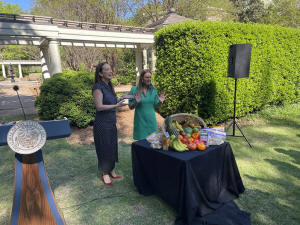Arkansas and Indiana ask USDA to let them ban soda and candy from SNAP
[April 16, 2025]
By JONEL ALECCIA and ANDREW DeMILLO
LITTLE ROCK, Ark. (AP) — Republican governors in Arkansas and Indiana
moved Tuesday to ban soft drinks and candy from the program that helps
low-income people pay for groceries, becoming the first states to ask
the Trump administration to let them remove such items from the program
long known as food stamps.
Arkansas Gov. Sarah Huckabee Sanders said her state's request is aimed
at improving the health of nearly 350,000 residents who participate in
the Supplemental Nutrition Assistance Program, or SNAP.
“Taxpayers are subsidizing poor health,” Sanders said at a Little Rock
news conference with U.S. Agriculture Secretary Brooke Rollins. “We’re
paying for it on the front end and the back end.”
In Indianapolis, Gov. Mike Braun was joined by U.S. Health Secretary
Robert F. Kennedy Jr. and Mehmet Oz, who leads the Centers for Medicare
and Medicaid Services, to announce sweeping changes to “put the focus
back on nutrition — not candy and soft drinks.”
The two states are among several taking steps to strip the purchase of
certain foods that may contribute to poor health through the federal
program that spent $100 billion to serve nearly 42 million Americans in
2024. The restriction has been a key goal for Rollins and Kennedy and
his “Make America Healthy Again” agenda.
“They changed our food system in this country so that it is poison to
us,” Kennedy said Tuesday. “We can’t be a strong nation if we are not a
strong people.”

The Arkansas plan, which would take effect in July 2026, would exclude
soda, including no- and low-calorie soda; fruit and vegetable drinks
with less than 50% natural juice; “unhealthy drinks;” candy, including
confections made with flour, like Kit Kat bars; and artificially
sweetened candy. It also would allow participants to use benefits to buy
hot rotisserie chicken, which is excluded from the program now.
The Indiana change would exclude candy and soft drinks from the list of
foods eligible to be paid for with SNAP benefits. Braun also issued
executive orders changing work requirements for SNAP participants;
reinstating income and asset verification rules; and launching a review
of “improper payments and other administrative errors” to ensure that
SNAP meets federal goals.
Antihunger groups oppose SNAP food restrictions, saying that research
shows that program participants are no more likely than other low-income
Americans to buy sugary drinks or snack foods. And they say that
limiting food choices undermines the autonomy and dignity of people who
receive a benefit of about $187 per month — or about $6.20 per day.
“They just seem to be targeting a specific population without having
data that says that they are the issue or that this is going to
improve,” said Gina Plata-Nino, a deputy director at the Food Research
and Action Center, a nonprofit advocacy group.
[to top of second column]
|

United States Agriculture Secretary Brooke Rollins, left, and
Arkansas Gov. Sarah Huckabee Sanders speak outside the Governor's
Mansion in Little Rock, Ark., Tuesday, April 15, 2025. Arkansas on
Tuesday requested to ban Supplemental Nutrition Assistance Program,
or SNAP, from being used to purchase junk food or soda. (AP
Photo/Andrew DeMillo)
 Trade groups representing beverage
and candy makers criticized the effort, saying that they narrowly
target SNAP participants.
Representatives for American Beverage accused state
and federal officials of “choosing to be the food police rather than
take truly meaningful steps to lift people off SNAP with good-paying
jobs.”
Chris Gindlesperger, a spokesman for the National Confectioners
Association, called the approach “misguided.”
"SNAP participants and non-SNAP participants alike understand that
chocolate and candy are treats – not meal replacements,"
Gindlesperger said.
The SNAP program is run by the USDA and administered through
individual states. It is authorized by the federal Food and
Nutrition Act of 2008, which says that SNAP benefits can be used for
“any food or food product intended for human consumption,” except
alcohol, tobacco and hot foods. In general, benefits are available
to households with gross income at or below 130% of the federal
poverty level, or about $33,500 a year for three people.
Excluding any foods would require Congress to change the law — or
for states to get waivers that would let them restrict purchases,
said Katie Bergh, a senior policy analyst for the Center on Budget
and Policy Priorities, a nonpartisan research group.
Over the past two decades, lawmakers in several states and from both
political parties have proposed halting SNAP payments for soda,
chips, ice cream and “luxury meats” like steak, as well as bottled
water and decorated birthday cakes. Since 2004, there have been six
previous requests for waivers, including four that were not
approved, one that was withdrawn and one request that was
incomplete.

In rejecting the waivers, the USDA said there was no clear standard
to define certain foods as unhealthy and that restrictions would be
difficult to implement, complicated, costly and might not change
participants' food purchases or improve health.
___
Aleccia reported from California. Associated Press writer Tom Murphy
in Indianapolis contributed to this report.
All contents © copyright 2025 Associated Press. All rights reserved |